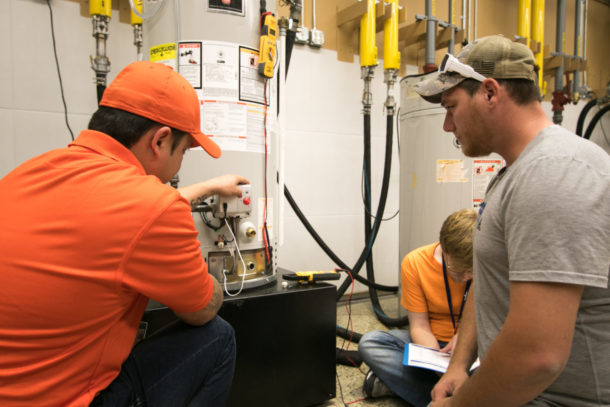Whether you are trying to fix a leaky faucet, install a new toilet, or tackle a larger bathroom renovation, the occasional plumping projects are a common part of home ownership. But how do you decide if you should don the DIY hat or bring in the professionals?
Keep reading to find out!

When to call in the experts
When it comes to new installations, especially those involving water supply lines and drainage systems, it is advisable to bring in professional plumbers. More advanced tasks like adding a new bathroom, installing a new dishwasher, or setting up an outdoor water feature are best left to the professionals.
Additionally, professional help is a must for extensive plumbing repairs such as fixing burst pipes, repairing sewer lines, or addressing water heater issues. These tasks involve intricate systems and potential risks, and attempting them without the necessary knowledge could worsen the problem.
Making the decision: DIY or professional plumbing
- Project complexity: While you might feel confident about fixing a leaky faucet, more complicated tasks like rerouting plumbing lines or installing a new toilet require specialized knowledge. If the project involves multiple components or if you are uncertain about the steps involved, it is wise to seek professional help.
- Budget and cost estimation: Even if you are skilled enough to tackle a project, you also need to assess the potential costs involved. This is where tools like a new construction plumbing cost estimator come into play. These tools factor in the cost of materials, labor, project complexity, and more to estimate the plumbing project’s final price. These insights can help you determine if handling the project yourself is more cost-effective or hiring professionals.
- Time and convenience: Time is another major factor you need to consider when making your decision. DIY projects can take a long time, especially if you are learning as you go. Professionals, on the other hand, can complete tasks efficiently, saving you precious time and sparing you from potential frustrations.
When to DIY
DIY can be a practical solution for minor leaks or dripping faucets. With some basic tools and patience, you can fix these issues without much trouble. Clogged drains are another common issue that DIY enthusiasts can often handle on their own. Using a plunger or a drain snake, you can clear out minor blockages.
The benefits of professional plumbing services
- Experience and expertise: Professional plumbers undergo rigorous training, possess in-depth knowledge of plumbing systems, and are well-versed in local building codes and regulations. For more complex projects like new installations or major repairs, their technical know-how ensures that the job is done correctly.
- Efficiency and time savings: Plumbing issues can disrupt your daily routine, and the longer they linger, the more inconvenience they cause. When you hire professionals, you are not just paying for their skills and expertise; you are paying for time and efficiency. Professionals can diagnose and resolve problems swiftly, minimizing disruptions and preventing potential water damage.
- Guarantees and warranties: Reputable plumbing companies offer guarantees and warranties on their work. The peace of mind that comes with knowing your plumbing work is backed by professionals can’t be overstated.
Wrapping up
The decision between DIY plumbing and professional plumbing services isn’t a one-size-fits-all proposition. Simple tasks might be more suitable for a DIY approach, whereas complex projects demand the expertise and assurance that can only come with professionals. You need to carefully assess your skill level, the complexity of the project, the time you can dedicate to the project, and your budget before you arrive at a decision.
Whether you are tightening a bolt or tackling a complete plumbing overhaul, remember that your ultimate goal is to maintain the functionality and integrity of your home’s plumbing system!




Join the conversation: